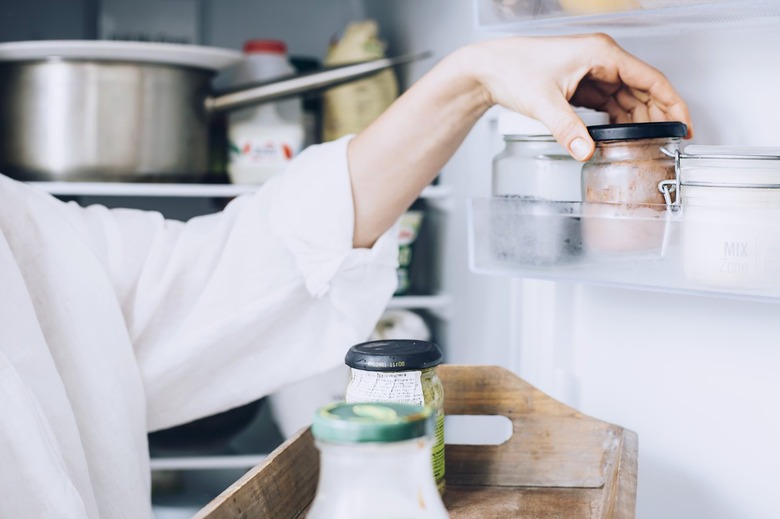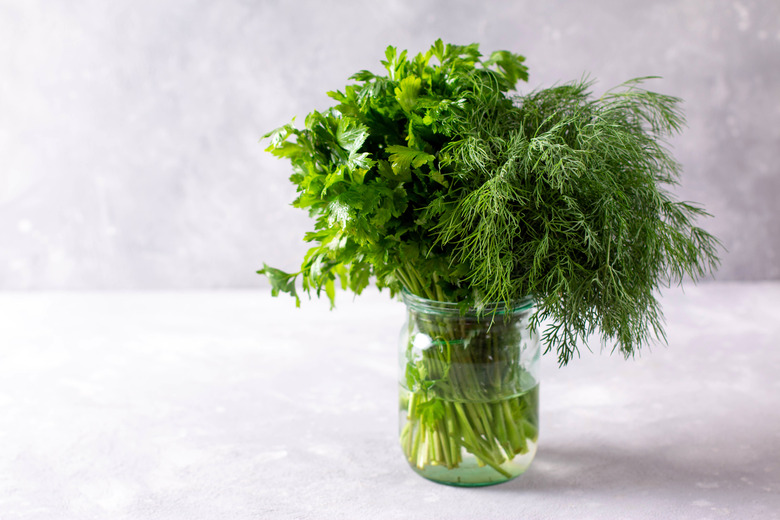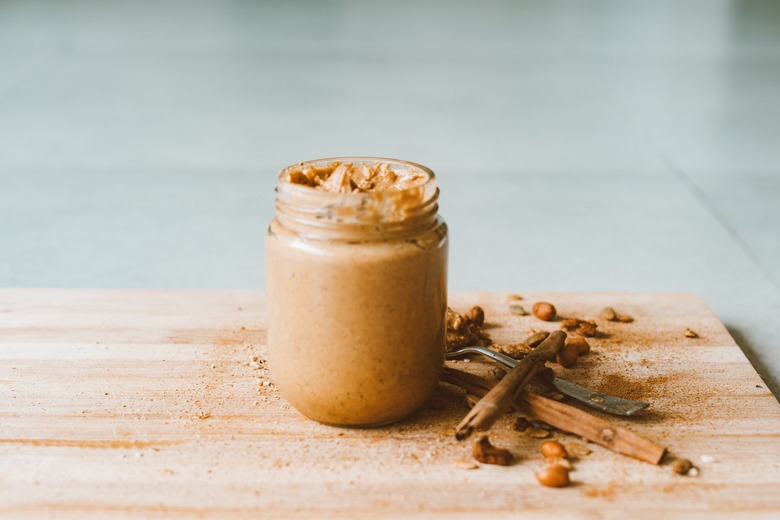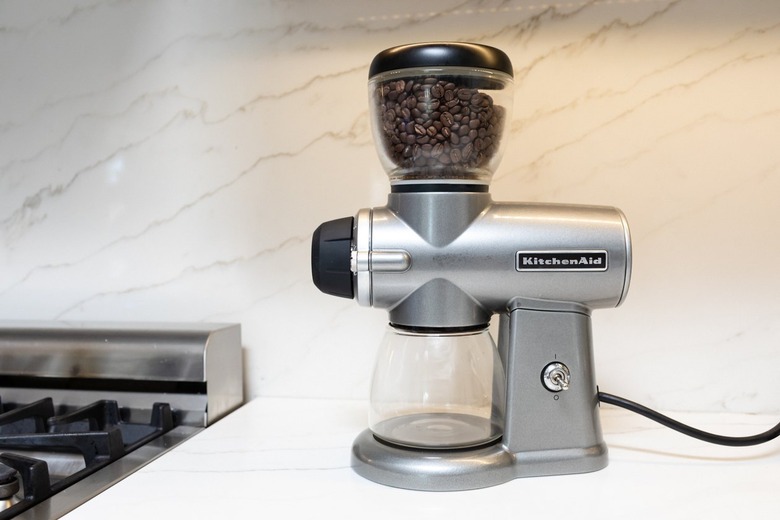How To Store Some Of The Most Confusing Foods
- How to store avocados
- How to store tomatoes
- How to store onions
- How to store fresh herbs
- How to store sriracha
- How to store ketchup
- How to store mayonnaise
- How to store peanut butter
- How to store jam
- How to store eggs
- How to store butter
- How to store cheese
- How to store nuts
- How to store popcorn kernels
- How to store coffee beans
- How to store chocolate
- How to store olive oil
- How to store holiday leftovers
Though we have modern appliances that make it easy to keep our food fresh, figuring out exactly where to store said food can be tricky. For instance, what is the best place to store different vegetables and fruit? What about condiments and all types of dairy products? Is it in the fridge, on the counter, or in the pantry? It's a lot to consider.
Fortunately, the answers are out there, and we consulted various experts to get all the details. Below, you'll find information on how to store some of the more confusing foods out there.
How to Store Avocados
How to Store Avocados
Kimberly Baker, the director of the food systems and safety program team at Clemson University Extension Service, tells Hunker that unripe avocados should be stored whole and uncut at room temperature. They should also be kept away from direct sunlight, says Oscar Hernandez, chef and culinary director of Tacombi, a Mexican food and beverage brand.
As for ripe avocados, Hernandez advises that you store those in the fridge, since the cold temperature will slow down the ripening process.
How to Store Tomatoes
How to Store Tomatoes
If they aren't yet ripe, Baker recommends storing your tomatoes in a loosely closed paper bag at room temperature, at about 65 to 70 degrees Fahrenheit. Uncut cherry, grape, Roma, and cluster tomatoes can be stored at this temperature for up to five days. All other types of tomatoes can be stored this way for two to three days. If you're unable to use them within this time frame, transfer them to the refrigerator.
How to Store Onions
How to Store Onions
"Onions should be stored where it is dry, cool, and well ventilated," Isabel Maples, a nutritionist and registered dietitian with the Academy of Nutrition and Dietetics, tells Hunker. "The pantry is better than the refrigerator."
How to Store Fresh Herbs
How to Store Fresh Herbs
How you store fresh herbs depends on the type of herb. Baker explains that tender herbs, like cilantro and parsley, should be kept in a jar of water in the refrigerator. Every one to two days, make sure you change out the water. Basil is the only exception. For this herb, Traci Weintraub — chef and founder of Gracefully Fed, a meal delivery service based in Los Angeles — tells Hunker that it should be kept at room temperature. You can also keep basil in a jar of water with a plastic bag over it, so that its environment remains humid.
Hardy herbs — like sage, oregano, thyme, and rosemary — can also be stored in a jar of water in the fridge. However, Weintraub recommends keeping them wrapped in a paper towel.
|
Tender Herbs |
Hardy Herbs |
|
Cilantro |
Sage |
|
Parsley |
Thyme |
|
Basil |
Rosemary |
|
Dill |
Oregano |
|
Mint |
How to Store Sriracha
How to Store Sriracha
"Sriracha can be stored in the fridge or the pantry," Maples tells Hunker. When it comes to how you store Sriracha, if you don't plan to use it all up within a short amount of time, refrigeration may be best because it will keep the condiment fresh for longer.
How to Store Ketchup
How to Store Ketchup
Maples explains that once it's opened, ketchup will only last about one month if it isn't refrigerated. That would be why ketchup should be stored in the fridge (unless you plan to use it up within a month, that is), away from heat and sunlight.
How to Store Mayonnaise
How to Store Mayonnaise
"Many shelf-stable foods, like mayonnaise, are packaged in sterile, airtight containers, and individual ingredients like eggs are pasteurized to eliminate any potentially harmful bacteria," Amy C. Keating, a registered dietitian, nutritionist, and the program leader at Consumer Reports, tells Hunker. However, once you open your jar, mayo should be refrigerated.
How to Store Peanut Butter
How to Store Peanut Butter
Should peanut butter actually be stored in the refrigerator? "You don't need to store your peanut butter in the refrigerator unless the package recommends it. Always check the package, but most supermarket peanut butters can be stored, opened, safely in a kitchen cabinet," Keating tells Hunker.
Of course, if you'd like to extend its lifespan and plan on eating the peanut butter over a long period of time, feel free to place it in the fridge. The same goes for natural peanut butter, which will last only a month on a pantry shelf, according to Maples.
How to Store Jam
How to Store Jam
"Jellies and jams can be stored in the pantry or cupboard if unopened. Once opened, jams and jellies should be stored in the refrigerator," Maples says. "Some argue that jelly's high sugar content coupled with its low pH and low moisture content mean that it can be left at room temperature once opened. Food safety experts disagree."
If you check the back of your jam jar, odds are you'll find that the manufacturer also recommends refrigeration.
How to Store Eggs
How to Store Eggs
When storing eggs, you'll want to remember that since eggs in the U.S. are washed, their protective coating is removed. As a result, April Rivas, a certified food safety instructor and the owner of ATC Food Safety, tells Hunker, "For safety reasons, in the U.S., we refrigerate commercially purchased eggs."
How to Store Butter
How to Store Butter
"Butter and margarine are safe at room temperature," the U.S. Department of Agriculture (USDA) writes, referring to how to store butter. "However, if butter is left out at room temperature for several days, the flavor can turn rancid, so it's best to leave out whatever you can use within a day or two." If you do decide to leave your butter out, to prevent contamination, make sure it remains covered.
How to Store Cheese
How to Store Cheese
The best way to store cheese depends entirely on the type of cheese, according to Olivia Roszkowski, chef-instructor at the Institute of Culinary Education. Here is a quick and handy chart:
|
Cheeses that come in a brine: |
best stored in that same brine. |
|
Soft and semi-soft cheeses: |
should be kept in a breathable material, like wax-coated paper, within a sealed container. |
|
Hard and semi-hard cheeses: |
rub a bit of neutral-flavored oil (like grapeseed or vegetable oil) on the surface of the cheese and then cover it in plastic wrap. |
|
Vacuum-packed and pasteurized cheese: |
keep it in its original container. |
How to Store Nuts
How to Store Nuts
If you plan to use your nuts within a few weeks, Maples explains that it's okay to store them in your pantry at room temperature. Beyond that amount of time, you should store your nuts in the fridge or freezer. "Store shelled nuts in the refrigerator or freezer in an airtight container or freezer bag to keep them cold, but away from humidity," registered dietitian Judy Barbe, author of Your 6-Week Guide to LiveBest, tells Hunker.
How to Store Popcorn Kernels
How to Store Popcorn Kernels
Laurine Wickett — founder of Left Coast Catering and head chef at Fluff Nugget, a gourmet made-to-order popcorn shop in San Francisco — tells Hunker that storing your popcorn kernels at room temperature is best. You'll also want to make sure that they are kept in an airtight container, so that the kernels retain their moisture. Contrary to what some might say, you should not store your kernels in the freezer.
How to Store Coffee Beans
How to Store Coffee Beans
Keating advises that coffee beans are stored in their original, sealed foil bag in a kitchen cabinet. If you no longer have the original bag, an airtight container will also work. She adds, "I would recommend buying beans in small quantities, a pound or package at a time. That way you will likely use up the beans before worrying about loss of freshness."
"The freezer is not the best place to store your coffee beans," Maples adds. However, if you do end up with excess coffee and need to store it away in the freezer, Keating recommends sealing it in an airtight container.
How to Store Chocolate
How to Store Chocolate
"Chocolate is best stored in a cool (55 to 70 degrees Fahrenheit) pantry or cupboard," Maples explains. "Keep chocolate away from sunlight and humidity. It can absorb other flavors, so it's best stored in an airtight container."
However, there is one exception. If your pantry or cupboard conditions feature high humidity or a temperature above 70 degrees Fahrenheit, you'll want to put all your chocolate in the refrigerator or freezer (depending on how often you plan to use it). "It'll last three to six months in the fridge, but the freezer should be used if it needs to be stored longer than six months," Maples says, adding, "It should be in an airtight container to avoid picking up the flavor of other foods."
How to Store Olive Oil
How to Store Olive Oil
The best place to store olive oil is one that limits exposure to light, heat, and oxygen, Olivia Roszkowski, chef-instructor at the Institute of Culinary Education, tells Hunker. This means the area should be enclosed, dark, and cool, like a kitchen cabinet or the pantry. However, make sure that cabinet or pantry is far away from the oven itself (because, you know, heat).
How to Store Holiday Leftovers
How to Store Holiday Leftovers
Maples and Barbe have seven tips for storing holiday leftovers:
- Clean out your fridge ahead of time and make sure it's between 35 and 40 degrees Fahrenheit.
- Refrigerate your food within two hours after it has been served.
- If you haven't eaten all of your leftovers within four days, freeze them.
- Wrap your leftovers as tightly as possible to keep them fresh.
- Divide your leftovers into shallow, two-inch containers. The smaller portions help with freshness.
- Reheat your leftovers, covered, to 165 degrees Fahrenheit.
- If you have any doubt about the quality of your leftovers, throw them out.




